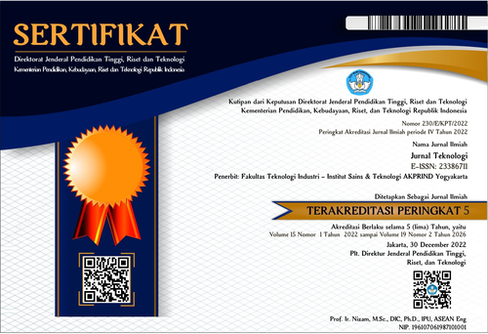Pengaruh Penambahan Gliserol dan Kaolin serta Variabel Suhu pada Pembuatan Bioplastik dari Kulit Pisang Raja
DOI:
https://doi.org/10.34151/jurtek.v17i2.4984Keywords:
banana peel, bioplastic, elongation, tensile strength, water absorption capacityAbstract
Bioplastic is a kind of plastic made from natural polymers such as starch with a mixture of plasticizers and fillers. Banana peel (Musa paradisiaca L) can be used as a source of starch because it contains high starch, which is approximately 80%. This study was aimed to determine the effect of variations in glycerol concentration, kaolin concentration, and stirring temperature on the characteristics of the bioplastic, where glycerol and kaolin act as plasticizers and fillers. The experiment was conducted by mixing raw materials in the form of banana peel powder, glycerol, and kaolin. The concentrations of glycerol and kaolin were varied at 5%; 10%; 15%; 20%; 25% v/w starch, and 5%; 10%; 15%; 20%; 25% w/w starch, respectively, until bioplastic with optimum mechanical properties was obtained. Furthermore, the experiment was continued with temperature variations of 65°C; 70°C; 75°C; 80°C; and 85°C. The quality of bioplastics was examined through the thickness, tensile strength, elongation percentage, water absorption, biodegradation, and FTIR tests. Optimum results were obtained in bioplastics with a glycerol concentration, kaolin concentration, and stirring temperature of 20%, 15%, and 75oC, respectively. The relatively best bioplastics yielded had characteristics of a thickness of 0.084 mm, tensile strength of 13.047 MPa, elongation of 13.13%, and water absorption of 3.56%. These results have met Indonesia's national standards for bioplastics.
Downloads
References
Darni, S.Y., dan Utami, H.B. (2010). “Studi Pembuatan dan Karakteristik Sifat Mekanik dan Hidrofobisitas Bioplastik dari Pati Sorgum”. Jurnal Rekayasa Kimia dan Lingkungan, 7(4), 88–93. https://jurnal.usk.ac.id/RKL/article/view/79
Hamzah, M. S. (2005). “Karakterisasi Kaolin Kab. Barru Sebagai Bahan Dasar Keramik”. Mektrik, 7(2),152649. https://www.neliti.com/id/publications/152649/
Hartmann, H. T., Hudson T., Kester, D. E., and Davies, F. T. (1990). “Plant Propagation: Principles and Practices”, 5th ed. New York: Prentice Hall
Haryati, S. D., Darmawati, S., dan Wilson, W. (2017). “Perbandingan Efek Ekstrak Buah Alpukat (Persea Americana mill) terhadap Pertumbuhan Bakteri Pseudomonas aeruginosa dengan Metode Disk dan Sumuran”. Prosiding Seminar Nasional dan Internasional, 1(1). Fakultas Ilmu Keperawatan dan Kesehatan Universitas Muhammadiyah Semarang. https://jurnal.unimus.ac.id/index.php/psn12012010/article/view/2886
Larson, E. R. (2015). “Thermoplastic Material Selection: A Practical Guide”, 1–348. https://doi.org/10.1016/C2013-0-18851-4
Made Heni Epriyanti, N., Admadi Harsojuwono, B., Wayan Arnata, I. (2016). “Pengaruh Suhu dan Lama Pengeringan terhadap Karakteristik Komposit Plastik Biodegradable dari Pati Kulit Singkong dan Kitosan”. Jurusan Teknologi Industri Pertanian, Universitas Udayana, Vol. 4, Nomor 1.
Mardiah, Ainul, M., Farma, R., Erman Taer, F. (2021). “Characterization of Physical Properties for Activated Carbon from Garlic Skin”. Journal of Aceh Physics Society, 10(4), 102–106. https://doi.org/10.24815/JACPS.V10I4.19571
Méité, N., Konan, L. K., Tognonvi, M. T., Doubi, B. I. H. G., Gomina, M., and Oyetola, S. (2021). “Properties of hydric and biodegradability of cassava starch-based bioplastics reinforced with thermally modified kaolin”. Carbohydrate Polymers, 254, 117322. https://doi.org/10.1016/J.CARBPOL.2020.117322
Nisah, K. (2018). “Studi Pengaruh Kandungan Amilosa dan Amilopektin Umbi-umbian terhadap Karakteristik Fisik Plastik Biodegradable dengan Plastizicer Gliserol”. Biotik: Jurnal Ilmiah Biologi Teknologi dan Kependidikan, 5(2), 106–113. https://doi.org/10.22373/BIOTIK.V5I2.3018
Nmiri, A., Yazoghli-marzouk, O., Duc, M., Hamdi, N., and Srasra, E. (2016). “Temperature effect on mechanical and physical properties of Na or K alkaline silicate activated metakaolin-based geopolymers”. Italian Journal of Engineering Geology and Environment, 16(1), 5–15. https://doi.org/10.4408/IJEGE.2016-01.O-01
Nurjannah, I., Ayu, B., Mustariani, A., dan Suryani, N. (2022). “Skrining Fitokimia dan Uji Antibakteri Ekstrak Kombinasi Daun Jeruk Purut (Citrus hystrix) dan Kelor (Moringa oleifera L.) sebagai Zat Aktif pada Sabun Antibakteri”. Spin Jurnal Kimia dan Pendidikan Kimia, Spin, 4(1), 23–36. https://doi.org/10.20414/spin.v4i1.4801
Pramono, E., Satrio, P., Prabowo, A., Purnawan, C., dan Wulansari (2012). “Pembuatan dan Karakterisasi Kitosan Vanilin Sebagai Membran Polimer Elektrolit”. ALCHEMY, Jurnal Penelitian Kimia, 8(1), 70–78
Rusdianto, A. S., Wiyono, A. E., dan Permatasari, D. E. D. (2021). “Karakterisasi Gelas Bioplastik Berbasis Pati Singkong (Manihot esculenta crantz) dengan Penambahan Serbuk Sabut Kelapa”. Gontor AGROTECH Science Journal. 7(1). Juni 2021, 91–107. DOI: http://dx.doi.org/10.21111/agrotech.v7i1.5755
Safitri, I., Riza, M., dan Syaubari, S. (2016). “Uji Mekanik Plastik Biodegradable dari Pati Sagu dan Grafting Poly(Nipam)-Kitosan dengan Penambahan Minyak Kayu Manis (Cinnamomum burmannii) sebagai Antioksidan”. Jurnal Riset Industri, 6(2), 107–116. https://doi.org/10.24960/JLI.V6I2.1914.107-116
Sinaga, Febrianto, R., Ginting, G. M., Hendra, M., Ginting, S., dan Hasibuan, R. (2014). “Pengaruh Penambahan Gliserol terhadap Sifat Kekuatan Tarik dan Pemanjangan Saat Putus Bioplastik dari Pati Umbi Talas”. Jurnal Teknik Kimia USU, 3(2), 19–24. https://doi.org/10.32734/JTK.V3I2.1608
Su, J. F., Huang, Z., Liu, K., Fu, L. L., and Liu, H. R. (2007). “Mechanical properties, bio-degradation, and water vapor permeability of blend films of soy protein isolate and poly-(vinyl alcohol) compatibilized by glycerol”. Polymer Bulletin, 58(5–6), 913–921. https://doi.org/10.1007/S00289-007-0731-7/METRICS
Sultan, N. F. K., and Johari, W. L. W. (2017). “The development of banana peel/ corn starch bioplastic film: a preliminary study”. Bioremediation Science and Technology Research, 5(1), 12–17. https://doi.org/10.54987/BSTR.V5I1.352
Sunardi, S., Susanti, Y., dan Mustikasari, K. (2020). “Sintesis dan karakterisasi bioplastik dari pati ubi nagara dengan kaolin sebagai penguat”. Jurnal Riset Industri Hasil Hutan, 11(2), 65–76. https://doi.org/10.24111/JRIHH.V11I2.5084
Suryanto, H., Rahmawan, A. W., Solichin, Sahana, R. T., Muhajir, M., and Yanuhar, U. (2019). “Influence of Carrageenan on the Mechanical Strength of Starch Bioplastic Formed by Extrusion Process”. IOP Conference Series: Materials Science and Engineering, 494(1), 012075. https://doi.org/10.1088/1757- 899X/494/1/012075
Syura, I. (2020). “Pembuatan dan Karakterisasi Film Bioplastik Pati Porang (Amorphophallus, SP) dan Kitosan dengan Plasticizer Sorbitol”. https://repositori.usu.ac.id/handle/123456789/29478
Downloads
Published
How to Cite
Issue
Section
License
Copyright (c) 2024 Siti Diyar Kholisoh, Faizah Hadi, Endang Sulistyawati

This work is licensed under a Creative Commons Attribution-ShareAlike 4.0 International License.
Jurnal Teknologi provides immediate open access to its content in order of making research freely available to the public to support a global exchange of knowledge. All articles published in this journal are free for everyone to read and download, under licence CC BY SA.
Benefits of open access for the author, include:
- Free access for all users worldwide.
- Authors retain copyright to their work.
- Increased visibility and readership.
- No spatial constraints.




















